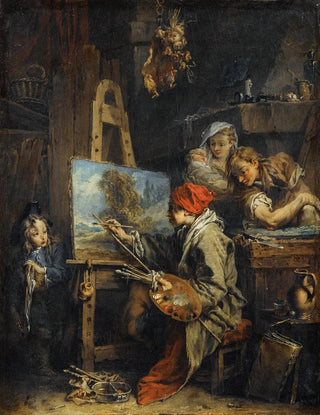Painting The landscape painter - François Boucher | Art print


View from behind

Frame (optional)
In the enchanting world of art, some works transcend time and space, captivating the imagination of viewers. "The Landscape Painter" by François Boucher is one of those creations that, through its visual richness and poetic atmosphere, invites prolonged contemplation. This piece, emblematic of the 18th century, not only showcases the artist's talent but also reflects the spirit of an era where nature and art intertwined harmoniously. Through this art print, we delve into a world where the landscape becomes a true actor on the scene, revealing nuances of light and color, while evoking a gentle melancholy.
Style and uniqueness of the work
Boucher's style is characterized by a delicacy and lightness that are uniquely his own. In "The Landscape Painter," the choice of pastel colors and fluid forms creates a serene and dreamy atmosphere. The touches of green, blue, and pink blend with astonishing harmony, while light plays a central role in the composition. Delicate shadows and subtle reflections on the water reinforce the idea of a lively and vibrant nature. This painting stands out for its almost impressionist approach, long before this movement emerged. The details, though present, are not overwhelming, allowing the eye to wander through the landscape, exploring every corner, every nuance. In doing so, Boucher invites us to feel nature rather than merely observe it, offering an immersive experience where the viewer becomes an actor in this idyllic scene.
The artist and his influence
François Boucher, an emblematic figure of French Rococo, knew how to marry refinement with an almost childlike sensitivity. Born in 1703, he was the official painter of the court of Louis XV, which allowed him to develop a style that combines elegance and sensuality. His work is marked by a fascination with mythology, nature, and everyday life, giving it a universal dimension. Boucher's influence is not limited to his era; it has persisted through the centuries, inspiring many artists and movements, notably neo-classicism.

Matte finish

View from behind

Frame (optional)
In the enchanting world of art, some works transcend time and space, captivating the imagination of viewers. "The Landscape Painter" by François Boucher is one of those creations that, through its visual richness and poetic atmosphere, invites prolonged contemplation. This piece, emblematic of the 18th century, not only showcases the artist's talent but also reflects the spirit of an era where nature and art intertwined harmoniously. Through this art print, we delve into a world where the landscape becomes a true actor on the scene, revealing nuances of light and color, while evoking a gentle melancholy.
Style and uniqueness of the work
Boucher's style is characterized by a delicacy and lightness that are uniquely his own. In "The Landscape Painter," the choice of pastel colors and fluid forms creates a serene and dreamy atmosphere. The touches of green, blue, and pink blend with astonishing harmony, while light plays a central role in the composition. Delicate shadows and subtle reflections on the water reinforce the idea of a lively and vibrant nature. This painting stands out for its almost impressionist approach, long before this movement emerged. The details, though present, are not overwhelming, allowing the eye to wander through the landscape, exploring every corner, every nuance. In doing so, Boucher invites us to feel nature rather than merely observe it, offering an immersive experience where the viewer becomes an actor in this idyllic scene.
The artist and his influence
François Boucher, an emblematic figure of French Rococo, knew how to marry refinement with an almost childlike sensitivity. Born in 1703, he was the official painter of the court of Louis XV, which allowed him to develop a style that combines elegance and sensuality. His work is marked by a fascination with mythology, nature, and everyday life, giving it a universal dimension. Boucher's influence is not limited to his era; it has persisted through the centuries, inspiring many artists and movements, notably neo-classicism.
12,34 €






